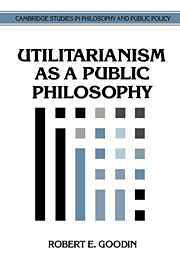Book contents
- Frontmatter
- Contents
- Preface
- Acknowledgments
- PART I INTRODUCTION: MORAL BASES OF STATE ACTION
- PART II MORALITY, PUBLIC AND PRIVATE
- PART III SHAPING PRIVATE CONDUCT
- PART IV SHAPING PUBLIC POLICIES
- 8 Liberalism and the best-judge principle
- 9 Laundering preferences
- 10 Heroic measures and false hopes
- 11 Theories of compensation
- 12 Stabilizing expectations
- 13 Compensation and redistribution
- 14 Basic income
- 15 Relative needs
- 16 What is so special about our fellow countrymen?
- 17 Nuclear disarmament as a moral certainty
- 18 International ethics and the environmental crisis
- References
- Name index
9 - Laundering preferences
Published online by Cambridge University Press: 28 January 2010
- Frontmatter
- Contents
- Preface
- Acknowledgments
- PART I INTRODUCTION: MORAL BASES OF STATE ACTION
- PART II MORALITY, PUBLIC AND PRIVATE
- PART III SHAPING PRIVATE CONDUCT
- PART IV SHAPING PUBLIC POLICIES
- 8 Liberalism and the best-judge principle
- 9 Laundering preferences
- 10 Heroic measures and false hopes
- 11 Theories of compensation
- 12 Stabilizing expectations
- 13 Compensation and redistribution
- 14 Basic income
- 15 Relative needs
- 16 What is so special about our fellow countrymen?
- 17 Nuclear disarmament as a moral certainty
- 18 International ethics and the environmental crisis
- References
- Name index
Summary
Want-regarding moralities like utilitarianism are continually embarrassed by the fact that some preferences are so awfully perverse as to forfeit any right to our respect. Judging states of affairs according to the utilities that they contain alone, we would be unable to distinguish the utility flow that comes from a starving person's being better fed from one that comes from his sadism being indulged. Where such perverse preferences are involved, we are intuitively opposed to ranking social states on the basis of “utility information” alone. Instead, we intuitively suppose we should try to bring “nonutility information” to bear, typically in the form of vested rights guarantees protecting people from the meddlesome (or indeed sadistic) preferences of others.
The theme of this chapter is that this retreat from utility to rights is premature. If the problem is that preferences sometimes seem “dirty,” then surely we should see whether they can somehow be “laundered” before discarding them altogether. The argument of this chapter is that we hesitate to launder preferences only because we are unsure of their fabric.
Recourse to nonutility information seems necessary merely because we work with such an impoverished conception of individual preferences in the first place. For the most part, they are just taken to be an individual's ranking of various social states. Whatever underlies this ordering ordinarily goes undiscussed. But, in truth, there is much more to individual utilities than is captured by simple numbers and rank-orderings.
- Type
- Chapter
- Information
- Utilitarianism as a Public Philosophy , pp. 132 - 148Publisher: Cambridge University PressPrint publication year: 1995
- 5
- Cited by



